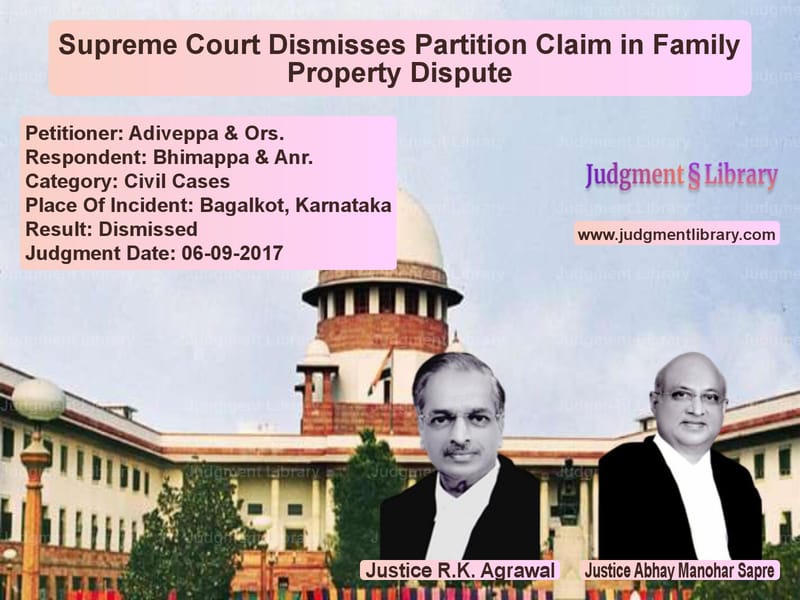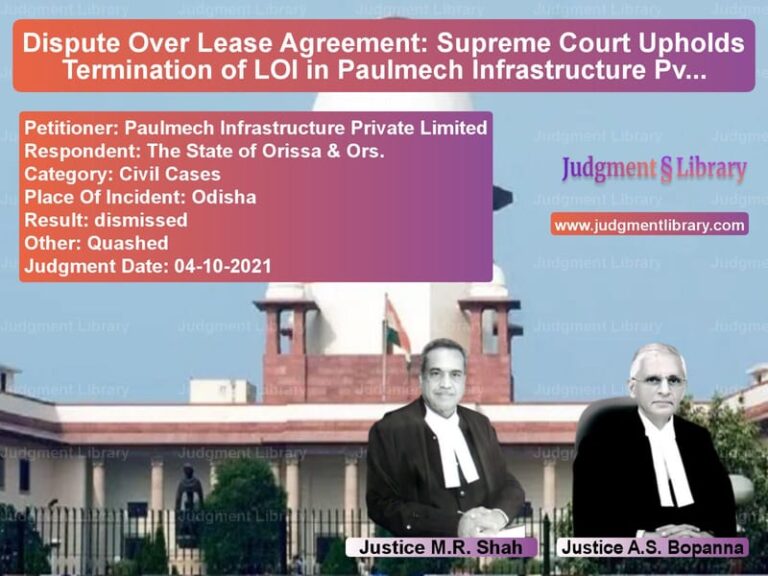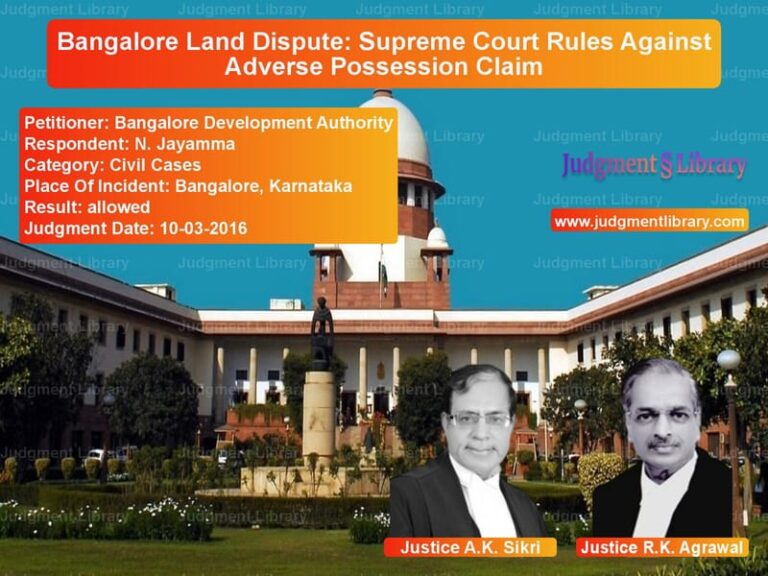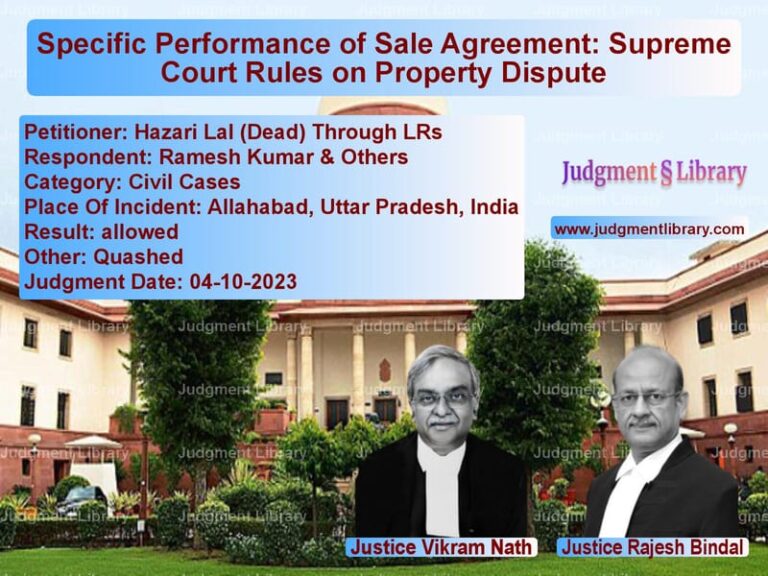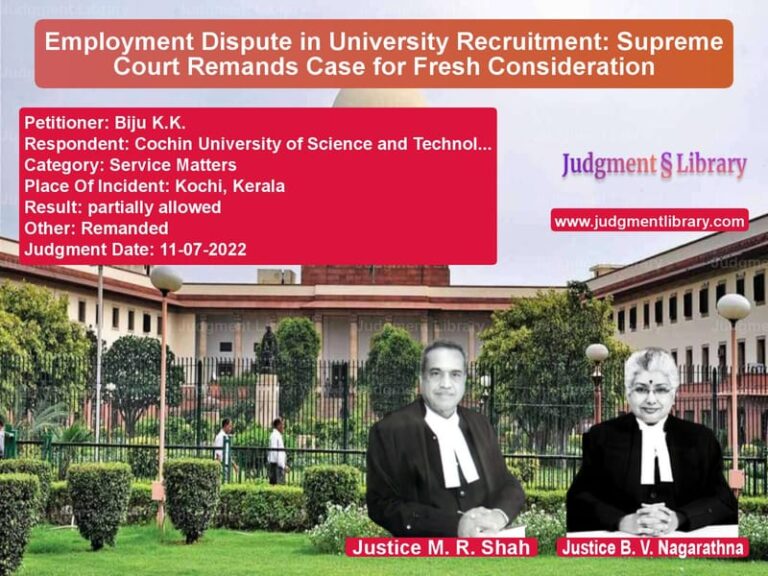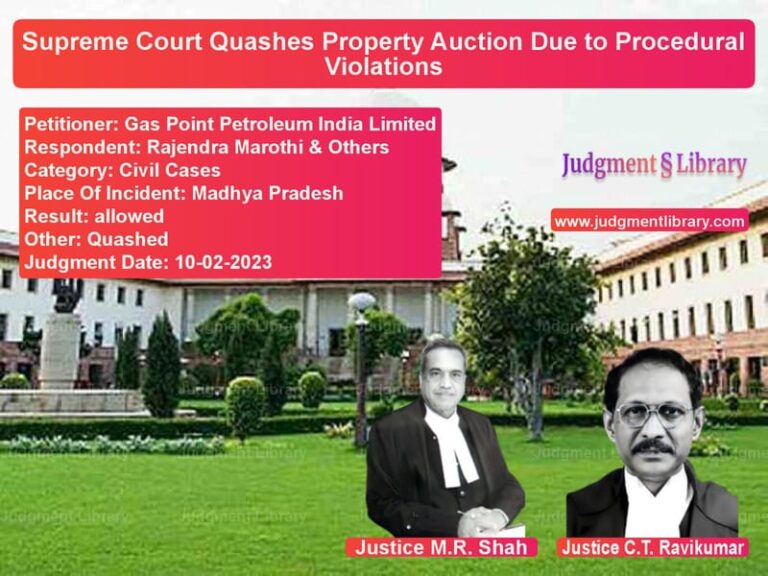Supreme Court Dismisses Partition Claim in Family Property Dispute
The case of Adiveppa & Ors. vs. Bhimappa & Anr. is a significant ruling by the Supreme Court concerning family property disputes, inheritance rights, and the presumption of joint family property under Hindu law. The dispute arose between members of the same family over the ownership and partition of agricultural land. The Supreme Court upheld the decisions of the lower courts and dismissed the claim for partition.
Background of the Case
The case was filed by the appellants (plaintiffs) against their uncle and aunt, seeking partition of the family’s agricultural land. The appellants, Adiveppa and Yamanappa, claimed that certain properties should be declared as their self-acquired property, while others should be partitioned as ancestral property.
The family tree of the litigants is as follows:
- Adiveppa (deceased) – Original head of the family.
- Yamanavva (deceased) – Wife of Adiveppa.
- Hanamappa (deceased) – Son of Adiveppa, father of the appellants.
- Bhimappa – Son of Adiveppa, uncle of the appellants (defendant no.1).
- Gundavva – Daughter of Adiveppa (defendant no.2).
- Adiveppa (Appellant No.1) – Son of Hanamappa.
- Yamanappa (Appellant No.2) – Son of Hanamappa.
The dispute arose after the death of Adiveppa and Hanamappa, leading to a conflict between the appellants and their uncle and aunt over the ownership and extent of shares in the agricultural lands.
Legal Issues in the Case
- Whether the plaintiffs could establish that certain properties were their self-acquired property.
- Whether the ancestral properties were partitioned prior to the litigation.
- Whether the plaintiffs were entitled to a 4/9th share in the ancestral properties.
- Whether the burden of proof was adequately discharged by the plaintiffs.
Arguments of the Petitioners (Adiveppa & Others)
- The plaintiffs claimed that the properties listed in Schedule ‘B’ and ‘C’ were their self-acquired properties and should be declared as such.
- They asserted that the properties in Schedule ‘D’ were ancestral properties and had not been partitioned.
- The plaintiffs contended that they were entitled to a 4/9th share in the ancestral properties as per Hindu succession laws.
- They argued that the burden of proof was on the defendants to establish that a partition had already taken place.
Arguments of the Respondents (Bhimappa & Gundavva)
- The defendants contended that all the properties, including those in Schedule ‘B’, ‘C’, and ‘D’, were ancestral.
- They asserted that an oral partition had already taken place on October 28, 1993, wherein all family members had accepted and taken possession of their respective shares.
- The defendants argued that the plaintiffs’ father (Hanamappa) had accepted the partition during his lifetime and that the plaintiffs’ claim was misconceived.
Supreme Court’s Observations
The Supreme Court examined the evidence and noted that both the Trial Court and the High Court had dismissed the plaintiffs’ claims. The Court observed the following:
- The plaintiffs failed to provide any documentary evidence to prove that the properties in Schedule ‘B’ and ‘C’ were their self-acquired properties.
- There was a legal presumption under Hindu law that all family properties are joint properties unless proven otherwise.
- The plaintiffs failed to provide any sale deed or proof of purchase that could establish that Schedule ‘B’ and ‘C’ properties were acquired independently.
- The oral partition of October 28, 1993 had been acted upon, and there was no valid challenge to its legality.
- The plaintiffs failed to prove their claim that the properties in Schedule ‘D’ remained unpartitioned.
The Court emphasized:
“The burden lies upon the member who, after admitting the existence of jointness in the family properties, asserts his claim that some properties out of the entire ancestral properties are his self-acquired property.”
Final Ruling
The Supreme Court dismissed the appeal and upheld the judgments of the lower courts. The key findings were:
- The plaintiffs failed to prove their claim that Schedule ‘B’ and ‘C’ properties were self-acquired.
- The plaintiffs also failed to establish that the Schedule ‘D’ properties remained unpartitioned.
- The oral partition of October 28, 1993 was legally valid and had been acted upon by all family members.
- The concurrent findings of fact by the lower courts were upheld, as they were not perverse or contrary to evidence.
- The plaintiffs’ appeal was dismissed, with no further remedy available.
The Court ruled:
“The legal presumption of joint family property remains unless proved otherwise. The plaintiffs have failed to discharge their burden of proof.”
Conclusion
This judgment reaffirms fundamental principles of Hindu succession law and property disputes. It underscores the burden of proof on individuals claiming self-acquisition of property within a joint Hindu family. The Supreme Court’s decision serves as a precedent for similar disputes, ensuring that legal presumptions regarding joint family property are upheld unless substantial evidence proves otherwise.
Don’t miss out on the full details! Download the complete judgment in PDF format below and gain valuable insights instantly!
Download Judgment: Adiveppa & Ors. vs Bhimappa & Anr. Supreme Court of India Judgment Dated 06-09-2017.pdf
Direct Downlaod Judgment: Direct downlaod this Judgment
See all petitions in Property Disputes
See all petitions in Succession and Wills
See all petitions in Landlord-Tenant Disputes
See all petitions in Judgment by R K Agrawal
See all petitions in Judgment by Abhay Manohar Sapre
See all petitions in dismissed
See all petitions in supreme court of India judgments September 2017
See all petitions in 2017 judgments
See all posts in Civil Cases Category
See all allowed petitions in Civil Cases Category
See all Dismissed petitions in Civil Cases Category
See all partially allowed petitions in Civil Cases Category

